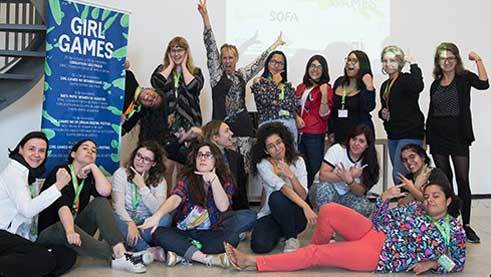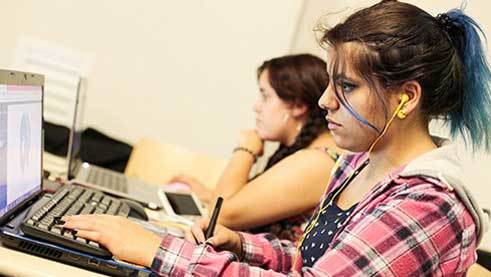Girl Games: Code-A-Thon for digital games
When the Princess Rescues the Prince

Young female game designers from Argentina, Bolivia, Brazil, Germany, Colombia and Peru came together for the Girl Games in São Paulo to revolutionise the game industry. The participants in this project by the Goethe-Institut all agree: the industry needs more women.
“Many female characters in digital games have a completely unrealistic appearance, appear in supporting roles at most and embody every conceivable cliché about women,” says Juliana Montes, a programmer from Bogotá. At the panel discussion “Women in the Industry” she talks about diversity in the game industry together with the Girl Games participants Sol Sanchez, programmer from Lima, and Isabella Rodolfo, game designer from São Paulo. “Game design is all about developing believable characters. That’s why we need more women in the design teams,” Montes says.
 The Girl Games participants
| Photo: Alile Dara Onawale
“Girls and women make up more than 50 percent of the world’s computer gamers. But they are a small minority in the content and artistic development and programming of digital games,” explains Caia Hagel, publisher of SOFA magazine and one of the curators of the programme. As mass media, digital games shape the perceptions of children, teens and adults. Social diversity can only be reflected in the games if the industry allows for diversity in the narratives and characters.
The Girl Games participants
| Photo: Alile Dara Onawale
“Girls and women make up more than 50 percent of the world’s computer gamers. But they are a small minority in the content and artistic development and programming of digital games,” explains Caia Hagel, publisher of SOFA magazine and one of the curators of the programme. As mass media, digital games shape the perceptions of children, teens and adults. Social diversity can only be reflected in the games if the industry allows for diversity in the narratives and characters.
Sexism in the games industry
The 13 game designers from South America and Germany, all between 21 and 25 years old, met in São Paulo on the invitation of the Goethe-Institut. They are still at the beginning of their careers and would like to enter the industry as programmers, graphic designers and game designers. Most of them are the only women in their degree programmes.During the two-week Girl Games programme, they discuss sexism in the industry and feminist movements like #MeToo, #NemUmaMenos and #NiUnaMenos in South America and Germany. In addition, they develop prototypes for digital games in teams. Their focus is on narratives that reflect their own experiences. The team around Constanza Garcia from Buenos Aires and Valeria Taborga from La Paz, for example, are developing a dating game for lesbian women. The “Coming Out Simulator” creates a playful approach to the real world of experience.
 The game designers Nicole Benítez and Laiz Garcia during the programme
| Photo: Gabriel Quintão
The game designers Nicole Benítez and Laiz Garcia during the programme
| Photo: Gabriel Quintão
“Teams with at least 30 percent women work best”
The programme also includes dialogues with professionals in the industry. Canadian game developer Brie Code, co-developer of two Assassin’s Creed games and founder of the studio TruLuv Media, spoke at the start of the project about her experiences in the games industry, noting, “Teams with at least 30 percent women work best.” The lack of women in the designer teams leads to the narratives and characters in games being strongly tailored to a male target group. This is how stereotypes solidify.“I always thought it was my own fault”
Alina Feindor, in the last semester of the undergraduate programme Game Art & 3D Animation in Frankfurt, says, “I am told very often that I take things too seriously and exaggerate, for example when I criticise derogatory comments about women in online gaming forums. But here, I’m hearing very similar stories from the other participants.”“I always thought it was my own fault that I feel so marginalised,” says Perla Pera, a software engineering student from Lima. “But the other Girl Games participants feel the same.”
Constanza Garcías, a game and animation artist from Buenos Aires, adds, “That was an important moment: when we all realised that we, as women making our way into the games industry, are having similar experiences.”
“The industry can’t ignore us”
The game industry is becoming more and more aware of the problem – as demonstrated by the many debates on diversity at gaming festivals and fairs. “Change has begun, but we are far from reaching our goal,” emphasises Juliana Montes. “Sexism in both the studios and in the games is still very present.”Sol Sanchez concludes, “We need more heroines, queer characters and socially critical issues in digital games. It’s time for the princess to rescue the prince. As women, we are not only talented programmers and artists, we also make up half of the market. The industry can’t ignore us.”
 The panel on “Women in the Industry”, f.l.t.r: Sol Sanchez, Juliana Montes, Ricarda Messner, Caia Hagel, Isabella Rodolfo, Marina Pecoraro
| Photo: Gabriel Quintão
The panel on “Women in the Industry”, f.l.t.r: Sol Sanchez, Juliana Montes, Ricarda Messner, Caia Hagel, Isabella Rodolfo, Marina Pecoraro
| Photo: Gabriel Quintão